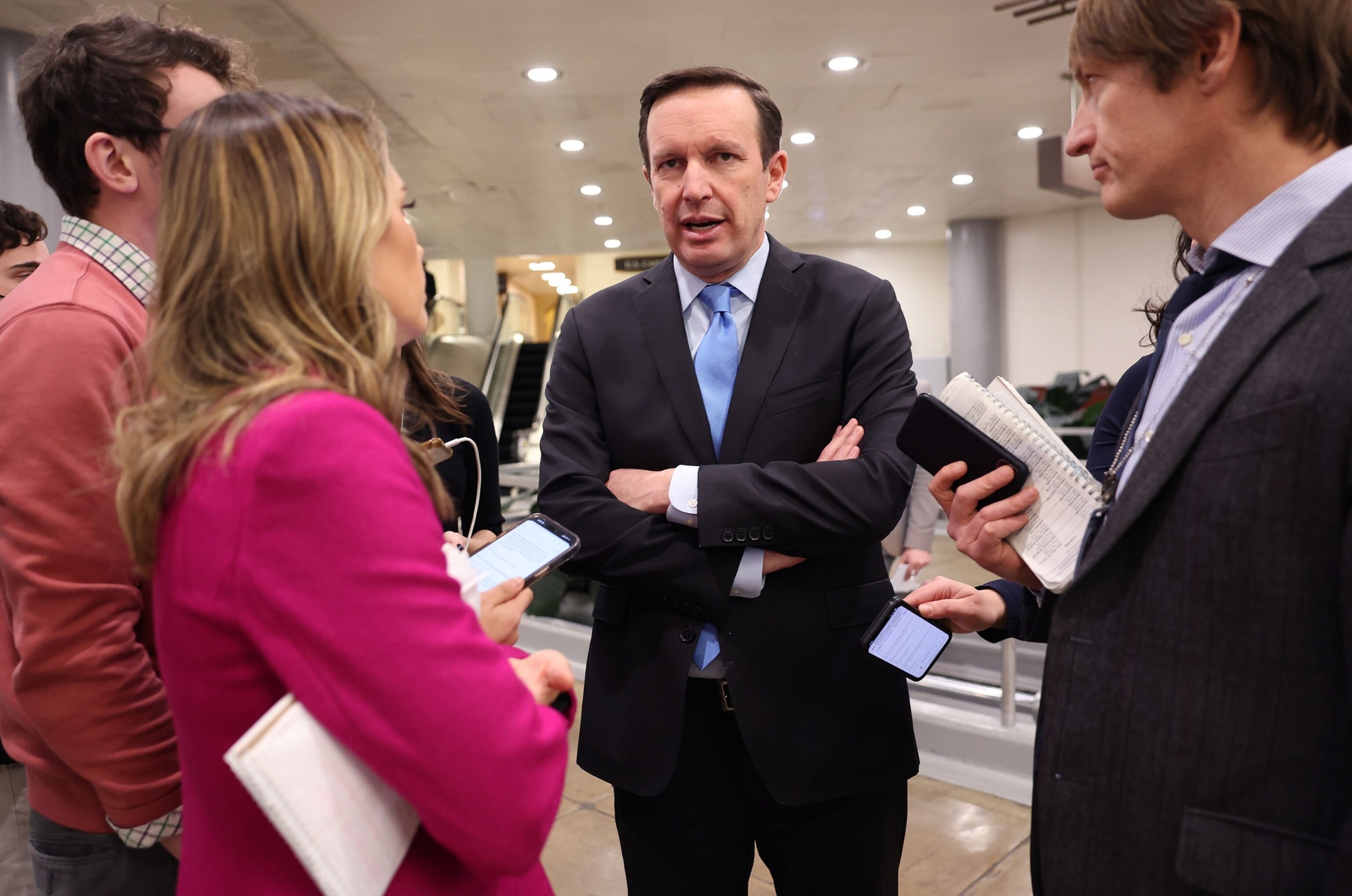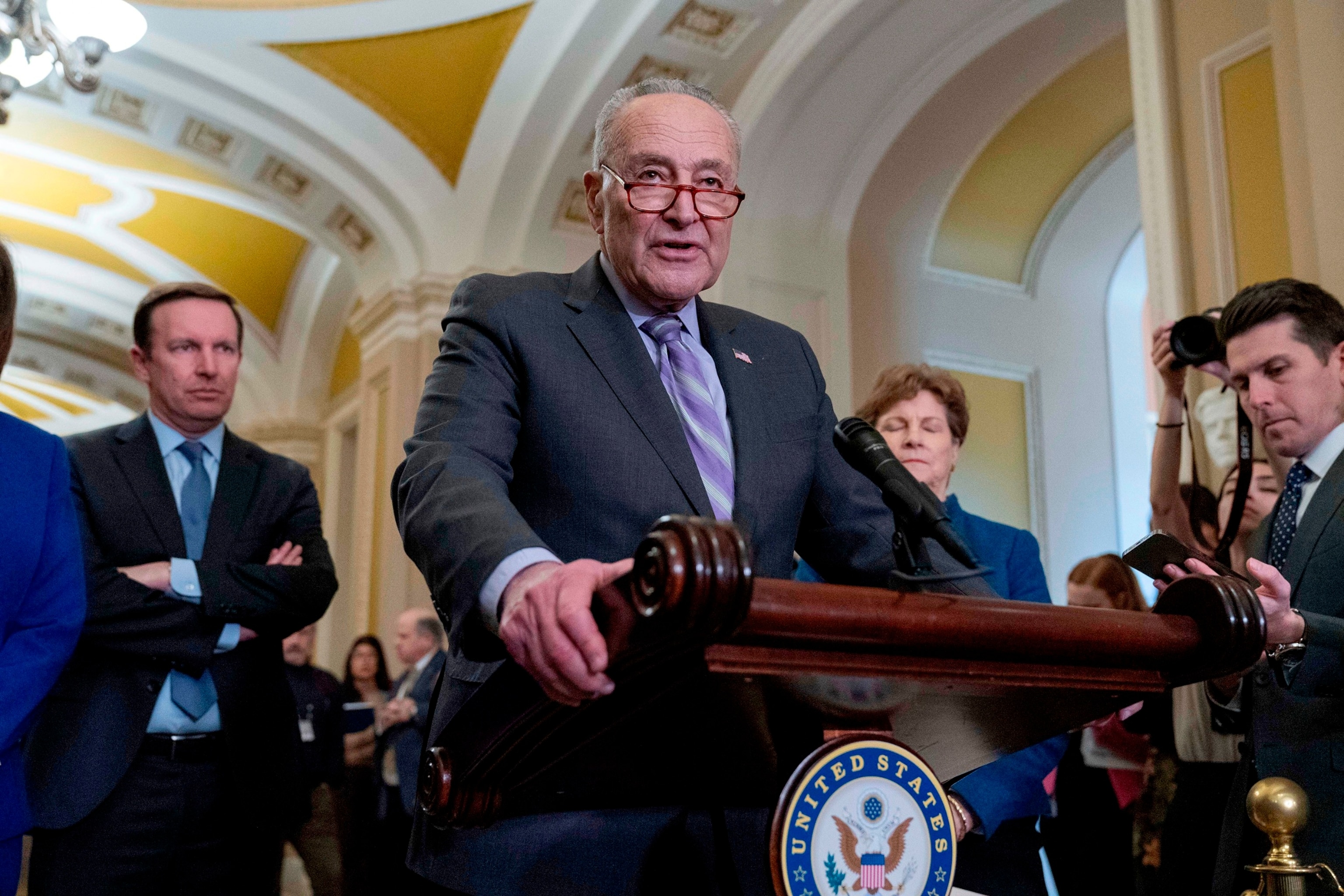'No real chance': McConnell says Senate border deal is going nowhere
"What the hell just happened?" Sen. Chris Murphy said on the Senate floor.
The Senate's bipartisan border deal is teetering on collapse Tuesday as many Republicans say they will block the procedural vote set for later this week -- a frustrating loss for the negotiators who spent months fine-tuning the bill.
"I can't believe this is happening. This is unbelievable," Sen. Chris Murphy, one of the lead negotiators of the bill, said in a Senate floor speech Tuesday.
Murphy and other senators worked for months to negotiate the terms of the $118.28 billion bipartisan national security supplemental package, the text of which was released Sunday night. By Monday night, it was on the brink of collapse as fellow negotiator Sen. James Lankford acknowledged it didn't have the votes for it advance in the Senate in a procedural vote on Wednesday.

"What the hell just happened?" Murphy, a Connecticut Democrat, said on the floor.
Majority Leader Chuck Schumer, in a floor speech on Tuesday, said he would be willing to delay the vote -- but was skeptical it would make a difference. Minority Leader Mitch McConnell said flat out that the bill is going nowhere.
In a closed-door meeting that lasted nearly 90 minutes Monday night, Republicans debated the merits of the 370-page national security supplemental, and whether or not to provide the necessary 60 votes to get to floor consideration of the bill during a key procedural vote on Wednesday.
A good chunk of the Senate Republican conference opposes this bill because they object to the policies in it. At least 19 have issued statements stating as much.
But many Senate Republicans, including those moderates who would likely be necessary to getting 60 votes to proceed during the upcoming test vote, left the meeting saying they won't greenlight moving it forward -- not because of policy -- but because they don't believe they've had sufficient time to review the technically complex border provisions.

"I think it's fair to say everybody thinks that, you know, voting Wednesday is voting too soon," said Sen. John Thune, the Republican Whip. "I think there's a very real concern that there hasn't been adequate time. And I think the Wednesday vote is going to be for most our members too early."
In floor remarks Tuesday, Schumer lambasted Republicans for their plans to block the the bill from advancing during an upcoming procedural vote.
"After months of good faith negotiations, after months of giving Republicans many of the things they asked for, Leader McConnell and the Republican conference are ready to kill the national security supplemental package, even with the border provisions they so fervently demanded," Schumer said.
Schumer said the GOP decision to reject the bill represents a "dramatic transformation in Republican thought." He said Senate Republicans and House Speaker Mike Johnson have "moved the goal posts" on negotiations.
"This is the new Republican line on the border: It's an emergency, but it can wait 12 months or until the end of time. What utter bunk," Schumer said.
Schumer said he'd be comfortable delaying the vote -- though he cast doubts on Republicans' motives for wanting the vote postponed.
"I will even offer to delay that vote until some time on Thursday to give even more time for Senators to make up their mind, but I suspect they won't accept even that offer because they don't really want more time, they're just using it as an excuse," Schumer said.

On Tuesday afternoon, McConnell put the nail in the coffin: "It looks to me and most of our members that we have no real chance here to make a law."
McConnell did not go after former President Donald Trump, who put immense pressure on Republicans to reject the deal, saying that the Border Patrol Council, which supported Trump, backed the bill.
"I think in the end, even though the product was approved by the Border Council that endorsed President Trump, most of our members feel that we're not going to be able to make law here. And if we're not going to be able to make a law, they're reluctant to go forward," McConnell said.

On Monday night, a number of moderate senators who would be needed to get to 60 votes said they would vote no on moving forward if the vote is held on Wednesday.
Sen. Mike Rounds, R-S.D., said he'd be amenable to continuing to work on the bill, but will vote to block it from moving forward on Wednesday.
"I think we said to begin with we wanted time. I still think we want time," Rounds said.
Sen. Dan Sullivan, R-Alaska, agreed.
"Clearly a bill of this magnitude being brought to the floor in 48 hours is really rushing it, so that's another element that we talked in there, which in my view is problematic," Sullivan said.
Even Lankford may choose to vote against proceeding on Wednesday if the rest of his conference isn't ready to move forward.
"I'm listening to the rest of the conference on this," Lankford said. "If the conference is not ready to be able to move on it, there's no reason for me to be able to vote on cloture. That's not voting against the bill."
Hours after the bill text was release Sunday, Speaker Mike Johnson shot it down, saying in a statement that the bill is "dead on arrival" and "even worse than we expected, and won't come close to ending the border catastrophe the President created."
Asked about Johnson's comments, Lankford acknowledged the challenge of drawing such a quick conclusion of the robust bill.
"People are throwing all these great hyperboles out there before they've really had a chance to be able to read through it and to be able to go through," Lankford told ABC News Senior Congressional Correspondent Rachel Scott. "It's interesting -- I've had folks saying, 'Hey this is really technical, it's going to take days or weeks to be able to read through it -- yet within minutes or hours they were saying, 'Hey, I oppose it because I've gone through it.'"
Senators did not give a clear read out of how much time they believed they'd need to consider this.
But several did say that any path forward would need to involve opportunities to offer amendments to the package.
ABC News' Rachel Scott contributed to this report.




